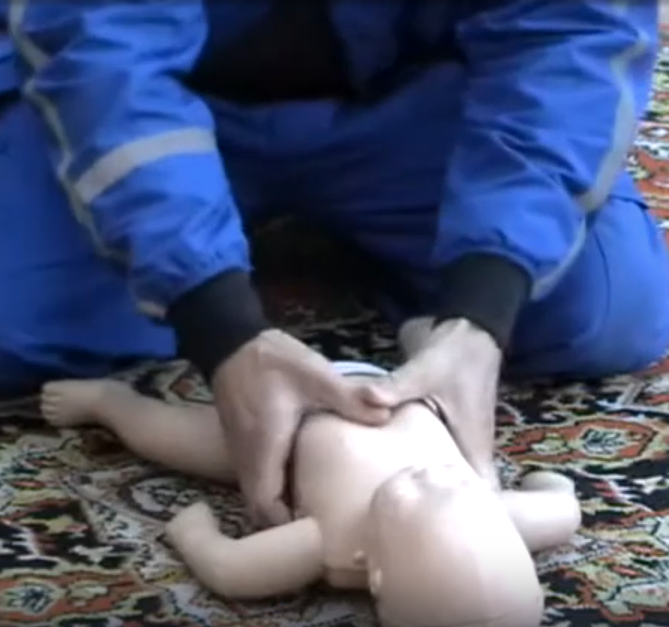CPR for an infant: Full CPR. Team work (two responders). Two-thumb encircling chest compressions. Rescue mouth-to-mouth breaths
Требуемые условия завершения
Authors: Rednenko V.V.
Editor: Rednenko V.V.
Clinical situation:
You are at home. A frightened neighbor has come running to you for help. She said her 8-month-old son was playing with toys and suddenly began coughing and choking heavily. Arriving at her apartment, you found an infant lying on the floor with no signs of life. The infant is not breathing. You have made a decision to perform CPR (single responder).
Equipment for the practical skill:
- protective medical gloves;
- СPR infant simulator.
The procedure for performing a practical skill
- First responder: Ensure safety of rescuer and the infant.
- First responder: Position yourself at the side of the infant.
- Second responder: Position yourself
- at the infant's feet;

-
- or at the infant's side on the opposite side from the first responder

- First responder: Check for the infant's responsiveness
- Use verbal stimulation.
- If there is no response, tap the bottom of the infant's foot.
- If the infant does not respond, decide that the infant is unconscious.
- Second responder: Ask a bystander (the infant's mother) to call to EMS (103) (or call youself) and provide information about:
- person condition: “The inant is unresponsive”;
- level of the first responder training: “I'm a doctor”;
- what are you planning to do: “I’m starting CPR”.
- First responder: Open the airway:
- Put one hand on their forehead.
- Place your fingers on the bony part of their chin.
- Gently tilt the head back while lifting the chin. Be careful not to tilt the head too far back as this can block the airway. Be sure to press on the bony part of the chin and not the soft part under the chin as pressing the soft part may also block the airway.

- First responder: Check infant's breathing. Keeping the airway open, place your ear or cheek above the infante's open mouth and gaze along the infante's chest:
- look for chest movements;
- listen at the infant's nose and mouth for breath sounds;
- feel for air movement on your cheek.
- First responder: In the unresponsive child, if breathing is absent or abnormal: give five initial rescue breaths.
- Put on the medical mask or use a special face mask.
- Open the airway again. Ensure a neutral position of the head.
- Hold the airway open by gently pressing forehead back and lifting chin with your fingers.
- Seal your mouth around the infant’s mouth and nose.

-
- Take the volume of air inside your mouth with inflated cheeks.
- Do a gentle exhale for a tiny puff of air using the air inside your mouth with your cheek muscles without using your respiratory muscles and the air in your lungs. Blow for one second and watch the chest rise.
- Repeat the rescue breath four more times.
- Second responder: Perform chest compressions using a two-thumb encircling technique
- Move any bulky clothing away from the chest
- Place both thumbs flat side by side on the lower half of the sternum (as above) with the tips pointing towards the infant's head.

-
- Spread both hands with the fingers together to encircle the lower part of the infant's rib cage.
- The fingers should support the infant's back.
- Push straight down approximately at least one third the anterior-posterior dimension of the infant's chest (4 cm) at a rate of 100 to 120 beats per minute.
- Let the chest recoil to its normal position after every compression.
- Count compressions.
- Do 15 compressions.
- First responder: After15 compressions, open the airway again and do two rescure breaths.
- First and second responder: Continue compressions and breaths in a ratio of 15:2 so that the pause, including the rescue breath, is no more than 10 s.
- First and second responder: Do not interrupt CPR at any moment unless there are clear signs of circulation (movement, coughing) or when exhausted.
Последнее изменение: вторник, 4 марта 2025, 09:37